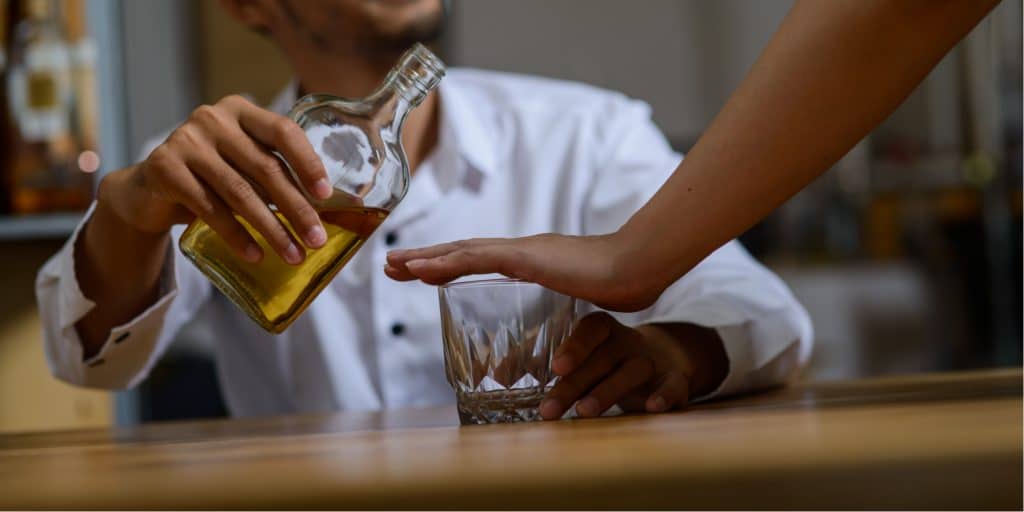
Have you ever felt the need to open a can of beer or pour a glass of wine after a stressful day? Even though this is a common habit that we see our friends, coworkers, and even favorite fictional characters do, stress drinking is actually a much bigger health concern than you’d think.
Alcohol and stress do not mix well. In fact, drinking alcohol to cope with stress can cause more serious mental health concerns, including alcohol abuse and alcoholism. If you find yourself drinking due to stress and aren’t sure of the dangers, now is the best time to get answers. Keep reading to learn the risks and find an alcohol rehab near you.
Table of Contents
What Is Stress Drinking?

There are rational reasons as to why people turn to alcohol in both moments of celebration and stressful situations. Alcohol is a natural depressant and acts as a sedative. This means that it directly affects your hormones, thought processes, and bodily sensations. Drinking alcohol often makes people feel relaxed, and it can make it easier to forget about stress. Thus, it makes sense why so many individuals pick up that bottle after a stressful day: they want to relax our bodies and minds.
Stress drinking is a phenomenon that is usually seen as appropriate in society and throughout the media we consume. Using alcohol to “calm the nerves” is often played off for laughs between friends and characters in movies. But what happens when you end up relying on alcohol to regulate your emotions?
The main difference between social drinking and having an alcohol use disorder (AUD) is that it stops becoming a “want” and instead becomes a necessary substance. And unfortunately, drinking “to relax” can quickly mean that alcohol becomes the only way an individual can relax. If coping without alcohol after a stressful day seems impossible, you might have developed a physical dependency to it that requires intensive treatment.
What Are the Symptoms of an Alcohol Use Disorder?
According to the National Institute on Alcohol Abuse and Alcoholism, almost 14.5 million adults in the United States had an alcohol use disorder (AUD) in recent years. However, it can be challenging to recognize the symptoms of an AUD simply because stress drinking is widely accepted in our society.
You might not know that you have an AUD, especially if you are in the habit of drinking in stressful situations. Some common symptoms of this substance use disorder include:
- Using alcohol as a coping mechanism to “push down” or “numb” painful emotions
- Using alcohol in moments of stress, anger, or sorrow
- Being unable to stop drinking after one drink
- Constantly thinking about drinking or making plans to drink
- Choosing alcohol over work, family, and other responsibilities
- Drinking too much or until you black out
- Making risky decisions, such as drinking and driving
- Feeling withdrawal symptoms (shaking, nausea, anxiety, etc.) when you are not drinking
- Worsening stress and severe mental health symptoms
For many people, having an alcohol use disorder is an issue that begins with a stress drinking habit and ends in serious health concerns, including co-occurring mental health disorders, physical illnesses, and even death. The side effects of stress drinking are vast and involve your emotional, mental, and physical health. Additionally, the effects of stress drinking can impact you both in the short- and long-term.
Though it may seem impossible to wind down after a stressful day or enjoy a social event without a drink in hand, a sober lifestyle is possible. And in many cases, finding treatment for an alcohol use disorder can actually save your life.
How Can I Stop Stress Drinking?

Many of the coping strategies to break your stress drinking habit involve emotional regulation. This is extremely helpful for anybody who is struggling with anxiety disorders, stress, and other mental health conditions. Some of the healthier coping mechanisms you can use are:
- Breathing exercises
- Practicing mindfulness
- Speaking with someone you trust
- Working through a treatment program
If you are used to using alcohol as a coping mechanism, it can be extremely challenging to learn healthier ways to destress on your own. This is where treatment for alcohol addiction becomes incredibly beneficial.
So, what exactly can a rehab recovery center do for you? To start, having the option to join a residential or inpatient rehab program. Residential rehab programs are made specially to keep you safe, sober, and healthy as you discover the dangers of stress drinking and relearn ways to cope with anxiety.
This is a physical and emotional journey that typically begins with monitored drug and alcohol detox. As you go through detox in a treatment program, you will have mental health professionals guide you through the challenges of withdrawal in a safe, calm environment.
After detox, you will have access to various treatment approaches, including evidence-proven methods such as:
- Substance use disorder counseling
- Recovery maintenance skills counseling
- Co-occurring challenges counseling
- Cognitive behavioral therapy (CBT)
- Dialectical behavioral therapy (DBT)
- Family therapy
Perhaps most importantly, during your time in treatment, you will make life-long connections to other patients who truly understand the struggles of alcohol abuse. You will work with others in process groups, experiential groups, psychoeducation groups, and peer support recovery groups. This goes to show you that, while you may feel alienated from the rest of the world as a result of your addiction and mental health conditions, you are not alone in your fight.
Where Can I Get Treatment for Alcohol Use Disorders?
If you have found yourself relying on alcohol consumption to “fix” moments of stress, you might be one of the millions of people in the United States who struggles with alcohol use disorders. But at the Vance Johnson Recovery Center in Las Vegas, Nevada, you will have all the support you need to practice coping without alcohol.
Don’t hesitate to call us at 888-838-6692 with your questions about stress drinking and the surprising alcohol and stress statistics in Nevada. Not yet ready to call? Fill out our confidential form online for support. Remember, stress drinking doesn’t have to be the norm. With us, you can break this habit and free yourself of harmful stress.
The post Dangers of Stress Drinking: Rising Risk of Alcoholism appeared first on Vance Johnson Recovery Center.
Source
Original Author: Vance Johnson Recovery Center

